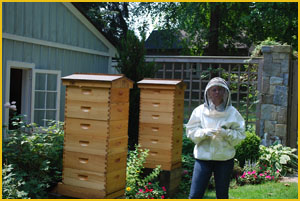Webcast: Honey Bees, Native Bees, Gardening, and More
PollinatorLIVE: Native Bees, Honey Bees, Gardening, and More was webcast at the Washington Youth Garden at the U.S. National Arboretum in Washington, D.C. Learn about our native and honey bees, tour the youth garden, and learn how good nutrition and pollinators are connected.
Tour of the Washington Youth Garden (English)
Green dreams sprout at the Washington Youth Garden where students plant and harvest vegetables and tend native plants. For more videos from this segment, go to: https://www.youtube.com/playlist?list=PLbluN1n0-ozrdryux4K-Gf9igTd_QiakD
Bees: Native and Honey (English)
Learn about our native and honey bees, the important role they play in the environment, threats to these pollinators, and how you can help.
For more videos from this segment, go to: https://www.youtube.com/playlist?list=PLbluN1n0-ozo4oj1a_YQCHbkS2bKinPeG&pbjreload=10
Bats, Butterflies, and Other Insect Pollinators (English)
Bees aren’t the only pollinators in the garden. Wtch to learn about bats, beetles, flies, and other insect pollinators. For more videos from this segment, go to: https://www.youtube.com/watch?v=fkce2Vydz6Y&list=PLbluN1n0-ozqxK53aauyzicNMYOveVq4u
Pollinator Kitchen Market and Café (English)
Join us in the Pollinator Kitchen. learn about composting with Woodsy Owl and watch the Rubbish Rot Rap.
For more videos from this segment, go to: https://www.youtube.com/watch?v=fkce2Vydz6Y&list=PLbluN1n0-ozqxK53aauyzicNMYOveVq4u
Here are some resources from Woodsy Owl:
- For lyrics to the Woodsy’s Rubbish Rot Rap, CLICK HERE.
- For Woodsy’s compost activity, “A Great Recipe for Garbage,” CLICK HERE.
- For more information about Woodsy Owl and Smokey Bear, click on the USDA Forest Service’s WEB SITE.
En Español
Polinizadores en Vivo: Abejas melíferas, abejas nativas y más era webcast el 29 de septiembre, 2010 desde al Jardín de la Juventud de Washington, D.C. en el Arboretum Nacional de los Estados Unidos. Vídeos de los programas están disponibles abajo:
OPRIME AQUÍ para mirar Paseo por el Jardín de la Juventud de Washington (español)
Los sueños verdes germinan en el Jardín de la Juventud de Washington (WYG) donde los alumnos plantan y cosechan verduras y cuidan de las plantas nativas.
OPRIME AQUÍ para mirar Abejas: Nativas y melíferas (español)
Vamos a aprender sobre las abejas nativas y el importante papel que desempeñan en el ambiente, las amenazas contra estos polinizadores y cómo podemos ayudarlos.
OPRIME AQUÍ para mirar Murciélagos, mariposas y otros insectos polinizadores (español)
Las abejas no son los únicos polinizadores del jardín. También están los murciélagos, mariposas y otros insectos polinizadores.
OPRIME AQUÍ para mirar Cocina y Café El Polinizador (español)
Debido a que los polinizadores ayudan a crear deliciosa comida que viene del jardín, (uno de cada tres bocados existe por los polinizadores), Carla Hall, finalista del Concurso de Cocina del Mejor Chef junto con varios alumnos, nos mostrarán cómo preparar deliciosa y sabrosa comida del jardín preparada con cariño. También, Woodsy Owl, nuestro amigo buhito, enviará su mensaje de conservación: Ésta es la "neta", cuida del planeta. Este amiguito nos enseñará mediante una actividad de composta para el jardín.
(PollinatorLIVE: Native Bees, Honey Bees, Gardening, and More was webcast on September 29, 2010 at the Washington Youth Garden at the U.S. National Arboretum in Washington, D.C.)
"Stung" by the Pollinator Bug
by Jessica Morrison, USDA Forest Service Intern Summer 2010
(Note: To watch a short video of Alison, watch Bees: Native and Honey above.)
Alison Fritz does not flinch as hundreds of bees furiously swarm around her in the sweltering heat. Safely clad in garments akin to something out of a science fiction novel, she comfortably slides open the lid of one of the three hives in her backyard. Fritz has been beekeeping for three years, and she is only 16 years old.
Having always been fascinated by insects, her unusual hobby was first sparked during a class about pollinators in the eighth grade.
“I’ve always liked insects. My dad taught me to pet bumblebees,” Fritz said. “When I began hearing about problems with the bee populations, I wanted to help.”
The Agriculture Research Service of the U.S. Department of Agriculture (USDA) recently reported a drop in the number of managed bee colonies from 5 million 60 years ago to 2.5 million today. This mysterious decline in North American honey bees has come to be known as Colony Collapse Disorder (CCD). The underlying cause of CCD has yet to be determined, but factors such as pesticides, genetically modified crops, and cell phone radiation are some possible suspects.
Interested in this phenomenon, Alison Fritz immediately got in touch with Pat Haskell, mentor for the Beekeepers Association of Northern Virginia, who helped her to get started and set up an apiary. The rest just fell right into place. Today, she has been recognized as the youngest beekeeper in Washington D.C., a feat which has granted an honorable visit to the White House; as well as, the ability to be a mentor for younger students.
Her work has also caught the eye of the U.S. Forest Service, who recently filmed a segment on Fritz for its PollinatorLIVE program. The event, which is the successor to the department’s 2009 MonarchLIVE, aims to provide students and teachers with an interactive way to learn about pollinating insects.
In August, Fritz, who has studied Mandarin Chinese, will spend her upcoming junior year abroad in Beijing. In the People’s Republic where crops must be hand-pollinated by humans because of the disappearance of bees in many places, she hopes to continue learning and educating about the importance of beekeeping.
The bees are especially angry by the time she closes the lid. “When it’s hot,” she explained, “it’s also usually the season that the nectar flow diminishes. That, in addition to the heat, makes for a very stressful time for the bees.”
About one third of the food Americans’ consume is benefited by pollinators, the USDA says. Alison Fritz and PollinatorLIVE are prime examples of people and organizations working to educate the community of the honey bee’s vast importance on global food chains, and to inspire communities and classrooms to take action against its decline.